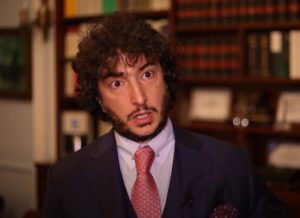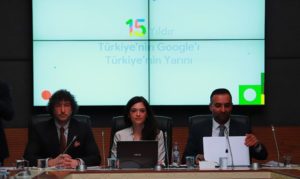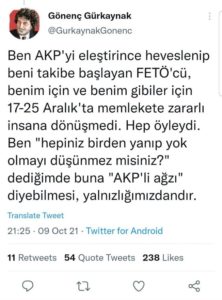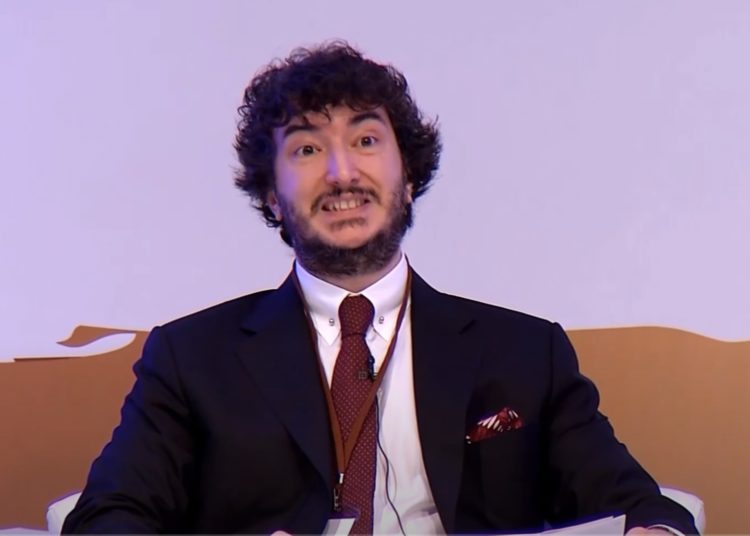Abdullah Bozkurt/Stockholm
Google’s lawyer in Turkey, who had called for exterminating and setting ablaze critics of President Recep Tayyip Erdoğan, bragged about how he led the charge among social media companies to comply with a restrictive new law that was criticized as yet another attack on freedom of expression and speech.
In a statement made before a parliamentary committee, Gönenç Gürkaynak, who represents Google LLC and its YouTube service as well as Twitter in Turkey, said he managed to break the hesitation felt by global social media companies in complying with the new Turkish law, which was adopted to further clamp down on criticism of the Erdoğan government.
“I can proudly say that it [Google] was one of the first companies to do so [comply with the new law]”, Gürkaynak told the lawmakers on December 2, 2021, bragging about how his client rushed to meet the demands of Turkish authorities.
“As you can imagine, when such legislation is passed at a time when there was hesitation from the viewpoint of international firms such as ‘Who will do what, should we be the first to do it or not, what will the effects be?’ we think Google’s stance by taking such a step [to appoint a representative] on January 12, 2021 set an example in terms of efforts to comply with the legislation,” he added in his statement to the newly established parliamentary Committee on Digital Outlets.
Committee minutes that show how Google’s lawyer bragged about quick compliance with the restrictive law on social media:
Gürkaynak was referring to the Law on Social Media, which was adopted in parliament in July 2020 after President Erdoğan branded social media as a threat and vowed to shut it down or gain control over it through legislation. A series of amendments to the law, officially titled Regulation of Internet Broadcasts and Prevention of Crimes Committed through Such Broadcasts (Law No. 5651), aimed to provide legislative and administrative tools necessary for the Erdoğan government to further curb freedom of speech under the pretext of combatting crime.
The amendment that drew the most ire of government critics was the requirement for social media companies with over 1 million users a day to appoint a permanent representative with an office in Turkey who would act as the contact person for Turkish authorities. The rationale was to allow the government to exert extra pressure on foreign companies to censure, remove or block critical content and force them to divulge private information on users.
Amnesty International, Human Rights Watch, Reporters Without Borders and the UN all expressed concern over the law’s requirements. “The law, if adopted, would further undermine the right of people in Turkey to freedom of expression, to obtain information and to participate in public and political life. As well, it would further weaken platforms that are essential for independent journalism,” a statement by Spokesperson for the UN High Commissioner for Human Rights Liz Throssell had said at the time.
Brushing aside such concerns, the Turkish government moved forward with the amendments and pushed them through parliament. In the event of a refusal to comply with the law, the Information and Communication Technologies Authority (BTK) was empowered to take action, such as fines or slowing their bandwidth. The Erdoğan government already has firm control over 90 percent of the traditional print and broadcast media in Turkey, following its closure of nearly 200 media outlets since 2016.

At the time, government critics and opponents hoped that companies like Twitter, Facebook and YouTube would not give in to Turkey’s threats and blackmail and would advocate for free speech and expression on their platforms. That turned out to be a false hope when Google decided to establish a local company under the name of Google Bilgi Teknolojileri Limited Şirketi (GBT) on January 12, 2021 and informed the BTK the next day that it had appointed a local representative.
Google was one of the first to break the resistance to government pressure after most social media companies including Facebook, Twitter, Tik Tok and YouTube did not appoint representatives by the November 2020 deadline. The only exception was a Russian social media company, VKontakte (VK). Turkish authorities fined each firm 10 million Turkish lira (1.3 million euros at the exchange rate in effect at the time) for failing to do so and vowed to impose a heftier fine if they did not comply in a month’s time. Google rushed to comply to avoid additional fines, followed by the others.
Gürkaynak, who was apparently instrumental in convincing Google to take this step, was also appointed as the lawyer representing the interests of Google’s Turkish company GBT. In a report submitted to the BTK in June, YouTube informed Turkish authorities that it had taken down more than 2,500 pieces of content from Turkey in the last five months.

Google’s lawyer also noted that the company has always shown sensitivity to the requests of Turkish authorities from various branches of government as well as the military since 2005. Erkan Kaptan and Zeynep Güven, Google Advertising and Marketing (Google Reklamcılık ve Pazarlama Şirketi) officials who are responsible for government relations and public policy, also testified at the hearing.
Gürkaynak explained how content removal from Google platforms has worked since the inception of the much-criticized Turkish social media law:
Gürkaynak, who also signed Twitter as a client, was accused of adopting the Turkish government’s narrative against critics and opponents. On October 9, 2021 he posted a scandalous hate message on his Twitter account, @GurkaynakGonenc, against supporters of the Gülen movement, asking if they ever considered exterminating themselves.
“Don’t you ever consider exterminating yourselves by setting yourselves on fire?” Gürkaynak wrote, addressing members of the movement, which has been a staunch critic of the Erdoğan regime on a range of issues from corruption to Turkey’s aiding and abetting of armed jihadist groups.
The tweet promoted outrage among many on Twitter, forcing him to ultimately delete it.

Servet Akman, a former Turkish diplomat who served in Israel and Kosovo, responded to Gürkaynak’s shocking tweet, asking the New York Bar Association, of which Gürkaynak is a member, to take action. “Gonenc Gürkaynak, a Turkish attorney registered at your Bar Association, has recently posted a tweet in Turkish that calls for burning and extermination of a group of people. Reminiscent of Holocaust, this act of your member has trembled me. Although he had to delete his tweet after receiving many reactions, I would kindly ask you to launch an investigation and expel him from your Esteemed Association,” wrote Akman.
Gürkaynak is a founding partner of ELIG Gürkaynak Attorneys-at-Law, a leading law firm based in İstanbul. He is a member of the New York and Brussels bar associations. Twitter and Google are among the clients he represents in Turkey. The Gülen group he attacked on social media and whose extermination he suggested has born the brunt of the vicious crackdown pursued by Turkish government against its opponents.
Judicial documents from court cases obtained by Nordic Monitor show that Gürkaynak has been in communication with the Turkish authorities on content removal and user information requests. He has a power of attorney from Twitter for pursuing his client’s interests in the Turkish market. The Twitter accounts of many journalists who live in exile became inaccessible following requests from the Turkish authorities.
Email communications from Gürkaynak’s office incorporated in the case file show he was informing Turkish authorities about the removal of content from Twitter on an intercepted illegal arms shipment bound for jihadists in Syria and transported by Turkish intelligence agency MIT:
In one case where many media outlets published photos from an intercepted illegal arms shipment to jihadists in Syria, the government obtained a court order to remove the links from Twitter and Facebook. The shipments, carried out by members of Turkish intelligence agency MIT, was exposed in January 2014 when local police and military units halted the trucks carrying the arms and examined the cargo. The case file shows emails from Gürkaynak, who informed the Association of Access Providers (ESB) that the content on the intercepted arms shipment was removed from Twitter.

The Turkish president blamed the Gülen movement for the exposure of the illegal arms shipment to Syria and claimed it was humanitarian aid despite the fact that photos and video footage of the cargo clearly showed heavy weaponry. The arms were transported from Ankara to the border with Syria for delivery to Turkish-backed jihadist groups in Syrian territory. The case was hushed up by the government, and the prosecutors and judges who investigated the illegal shipment were dismissed and later imprisoned on bogus charges.
Erdoğan has been targeting followers of the Gülen movement, a group that is led by US-based Turkish Muslim cleric Fethullah Gülen, since the corruption investigations of December 17-25, 2013, which implicated then-prime minister Erdoğan, his family members and his inner circle.
Power of attorney from Twitter that designates Gönenç Gürkaynak and his partner as their lawyers in Turkey. The documents were submitted to Turkish judicial authorities:
Dismissing the investigations as a coup against his government, Erdoğan accused the movement of being behind the graft probes, labelled it as a terrorist organization and launched an unprecedented crackdown on its members. He locked up tens of thousands including many prosecutors, judges and police officers involved in the investigation as well as journalists who reported on them.
Erdoğan intensified the crackdown on the movement following a coup attempt on July 15, 2016 that he accused Gülen of masterminding. Gülen and the movement strongly deny involvement in the abortive putsch or any terrorist activity.
According to a statement from Interior Minister Süleyman Soylu on February 20, a total of 622,646 people have been the subject of investigation and 301,932 have been detained, while 96,000 others have been jailed due to alleged links to the Gülen movement since 2016. The minister said there are currently 25,467 people in Turkey’s prisons who were jailed on alleged links to the movement.













